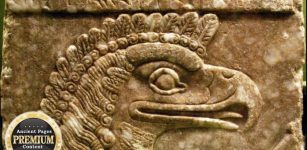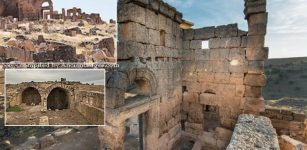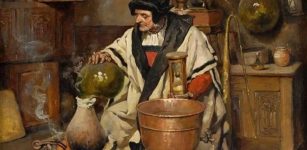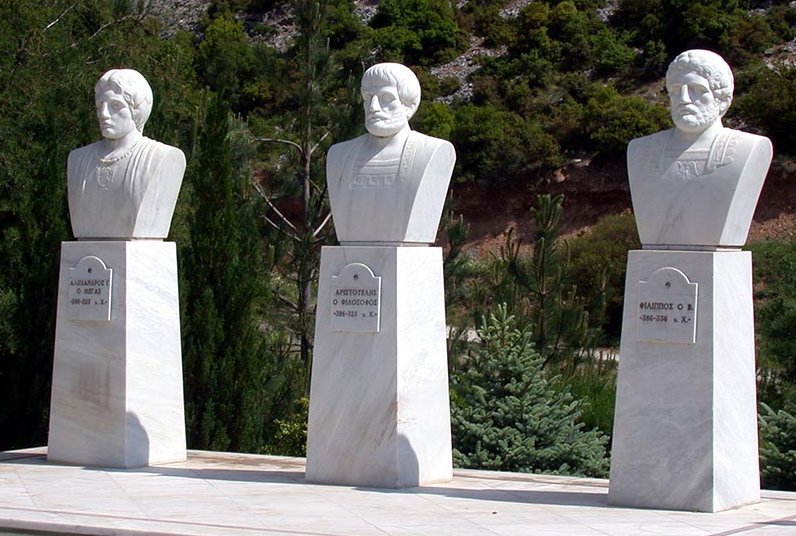Aristotle’s Influence On Education Of Alexander The Great – Historical Encounter Of Two Famous Men
A. Sutherland - AncientPages.com - In the 4th century BC, two great individualities of the contemporary world met: Alexander the Great (356–323 BC) and Aristotle of Stagira (384–322 BC), one of the greatest philosophers of all time.
Aristotle teaches young Alexander. Image credit: Charles Laplante (1837–1903) via Wikipedia
In 343/342 BC, when Alexander was a 13-year-old prince, his father, Philip II, Macedonian ruler of the kingdom of Macedon from 359 BC to 336 BC, called Aristotle to his court. Aristotle was a tutor worthy of the prince, so Philip employed him and paid a handsome and appropriate fee.
Alexander's Education Place - Midas Gardens In The village of Mieza
Pella (where Alexander was born) was not a good place for the young prince at this stage in his career. Even the influence of Olympias, Alexander's mother who lived in Pella, could negatively influence young Alexander. Higher education for the young Alexander demanded rural solitude and harmony rather than unhealthy political and court intrigues.
King Philip assigned Aristotle the Precinct of the Nymphs at Mieza, a village in Ancient Macedon, as a place of education.
According to Plutarch (45 – 127 AD), a Greek biographer and essayist, Alexander was initially influenced by his earlier teachers. However, Philip did not trust them much.
Aristotle And His Mind
Aristotle's interests included logic, physics, the theory of poetry, politics, and nature, to considerations on the foundations of reality and morality, but he was not very fond of mathematics.
 Excavations of the "Aristotle School" near Naousa. Image credit: Jean Housen - CC BY-SA 4.0
Excavations of the "Aristotle School" near Naousa. Image credit: Jean Housen - CC BY-SA 4.0
He was a student of the great philosopher Plato and studied at his school, the Academy, for 20 years. Aristotle was also a great naturalist and one of the first known historians of bibliophiles. The genius mind taught Alexander and probably some other very young nobles who later became great chiefs and kings.
The employment as a tutor gave Aristotle many new opportunities. He could establish a library in his Lyceum in Athens, and king Philip resettled Aristotle's birthplace Stageira), bringing back those of its citizens who had been enslaved or exiled.
Aristotle's Teaching Of Alexander
The cooperation lasted three years and unquestionably influenced Alexander, the young heir to the throne.
We know about this education mainly from the second, third, and even fourth hand. The young pupil certainly read Homer's "Iliad" and "Odyssey," the basis for the education of every cultural Greek. The copy of the "Iliad" with Aristotle's comments always accompanied him. He even took it with him for a war campaign that would take Alexander from Greece to India and make him the conqueror of almost the entire world (known to the ancients).
However, there are good reasons to think that the student did not follow the path the philosopher pointed out to him.
Aristotle passed many of his ideas on to Alexander; however, it is not clear how his studies influenced the young man's mind. There are no surviving books, letters, papers, or other works resulting from the teachings in Mieza.
The young Alexander was interested in reading and learning. His favorite book Homer's Illiad, was of great importance to him. It was his guidebook of the art of war '.
According to Onesicritus, a Greek historical writer, who accompanied Alexander the Great on his campaigns in Asia, Alexander took Aristotle's revised version – the so-called "casket copy" and always had it under his pillow along with his dagger.
Busts of Alexander the Great, Aristotle and Philip II of Macedonia. Image credit: Vlasis Vlasidis - CC BY-SA 3.0
It was not easy to find books in isolated regions of Asia, So Alexander ordered to send him the texts of Sophocles, Aeschylus, and several tragedies by Euripides.
In the book "Alexander the Great," Waldemar Heckel and J.C. Yardley say:
"Initially, he had great regard for Aristotle, whom he loved no less than his father, as he used to say – thanks to the one he had life, and thanks to the other, he knew how to live well.
Later, however, he regarded Aristotle with some suspicion, not enough to want to do him harm, but the fact that his familiarity with him lacked its former intensity and warmth indicated a rift in their relationship...."
Aristotle taught Alexander to regard hedonistic life as entirely worthless. It must have had a strong appeal for Alexander, who possessed highly developed self-control and self-denial (at least during the earlier stages of his career). He used to eat very little and give away spoils of war, keeping very little for himself.
Therefore, at the beginning of his reign, Alexander followed his teacher's doctrine and fought against hedonism.
Intellectual Achievements Of Alexander
Alexander developed "a strong interest in medicine and biology — two more of Aristotle's own favorite subjects. Throughout his life, he was, Plutarch says, 'not only fond of the theory of medicine, but actually came to the aid of his friends when they were sick, and prescribed for them certain treatments and regimens". (P. Green, Alexander of Macedon, 356–323 B.C)
Alexander had much scientific curiosity and respect for science. When Alexander launched his Asiatic invasion, he took with him zoologists, botanists, and other scientific experts who later contributed crucial material for science.
He read and discussed poetry, especially Homer; he was taught basics in geometry, astronomy, and rhetoric and was interested in philosophy, medicine, and natural sciences.
Political Views Of The Young King And Warrior
It isn't easy to establish to what extent Aristotle's philosophical views have shaped the young Aleksander's way of thinking. Most probably, there were very few things that both agreed on, said the 20th-century philosopher Bertrand Russell.
Aristotle's political views were based on the obsolete concept of the Greek city-state at that time. The idea of a small city-state could not speak to an ambitious prince who wanted to build a large, centralized empire. Alexander also had to be skeptical about the Aristotelian principle of treating non-Greeks like slaves, because he was dreaming of a vision of an empire based on fruitful, partnership cooperation between winners and the losers.
Alexander The Great Disagreed With Aristotle On Some Issues
In his book "Alexander the Great, "Peter Green writes that if Alexander took over some of his tutor's ethics, he did not agree with his teaching about the state.
Aristotle believed in the division of people into Greeks and Barbarians. These views are reflected in his quest to gain glory at the expense of people standing lower than the Greeks. Slavery was entirely natural for him, and non-Greeks were supposed to be non-Greeks. According to Aristotle's teachings, Alexander wanted to become a Greek Chief and a despot for the Barbarians. He despised the Athenian democracy, convinced of his family's supremacy over all other people and nations.
The three years spent with Aristotle and his teachings played a crucial role in the life of Alexander and left a permanent mark on him. These two prominent minds met only occasionally, if at all.
Once his education was accomplished, Alexander was on his own.
Written by – A. Sutherland - AncientPages.com Senior Staff Writer
Updated on October 1, 2022
Copyright © AncientPages.com All rights reserved. This material may not be published, broadcast, rewritten or redistributed in whole or part without the express written permission of AncientPages.com
Expand for referencesMore From Ancient Pages
-
 Mystery Of The Candelabrum: One Of The Most Enigmatic Ancient Giant Ground Drawings In The World
Featured Stories | Nov 2, 2015
Mystery Of The Candelabrum: One Of The Most Enigmatic Ancient Giant Ground Drawings In The World
Featured Stories | Nov 2, 2015 -
 Mysterious 4,000-Year-Old Table-Like And Unique Dolmen Discovered In Galilee Hills, Israel
Archaeology | Mar 6, 2017
Mysterious 4,000-Year-Old Table-Like And Unique Dolmen Discovered In Galilee Hills, Israel
Archaeology | Mar 6, 2017 -
 Tiny Tools And Skills Of Mysterious Toaleans People In Southernmost Sulawesi, Indonesia
Archaeology | May 27, 2021
Tiny Tools And Skills Of Mysterious Toaleans People In Southernmost Sulawesi, Indonesia
Archaeology | May 27, 2021 -
 First Insight Into 3,500-Year-Old Cuisine Of The Enigmatic Nok Culture
Archaeology | Jan 17, 2022
First Insight Into 3,500-Year-Old Cuisine Of The Enigmatic Nok Culture
Archaeology | Jan 17, 2022 -
 Battle Of Himera: New Study That Contradicts Historical Accounts
News | May 24, 2021
Battle Of Himera: New Study That Contradicts Historical Accounts
News | May 24, 2021 -
 Beer ‘Chicha’ Helped To Keep Peruvian Wari Empire Stable – New Study
Archaeology | Apr 23, 2019
Beer ‘Chicha’ Helped To Keep Peruvian Wari Empire Stable – New Study
Archaeology | Apr 23, 2019 -
 How Did Hindu God Shiva Get His Third Eye?
Featured Stories | May 13, 2019
How Did Hindu God Shiva Get His Third Eye?
Featured Stories | May 13, 2019 -
 Archaeologists Examined Ancient Houses To Learn About History Of Inequality
Archaeology | Apr 16, 2025
Archaeologists Examined Ancient Houses To Learn About History Of Inequality
Archaeology | Apr 16, 2025 -
 Underwater Drone Images Reveal Oldest Human-Made Structure In The Baltic Sea
Archaeology | Feb 13, 2024
Underwater Drone Images Reveal Oldest Human-Made Structure In The Baltic Sea
Archaeology | Feb 13, 2024 -
 Adapa – Why Did The Wise Apkallu Refuse The Gift Of Immortality?
Featured Stories | May 9, 2019
Adapa – Why Did The Wise Apkallu Refuse The Gift Of Immortality?
Featured Stories | May 9, 2019 -
 Mysterious Jawbone May Represent Earliest Presence Of Humans In Europe
Archaeology | Dec 7, 2022
Mysterious Jawbone May Represent Earliest Presence Of Humans In Europe
Archaeology | Dec 7, 2022 -
 1,800-Year-Old Entrance To Turkey’s Zerzevan Castle Found Among The Ruins
Archaeology | Aug 15, 2020
1,800-Year-Old Entrance To Turkey’s Zerzevan Castle Found Among The Ruins
Archaeology | Aug 15, 2020 -
 First Humans Appeared In Europe 1.4 Million Years Ago – Stone Tools Found At Korolevo Reveal
Human Beginnings | Mar 8, 2024
First Humans Appeared In Europe 1.4 Million Years Ago – Stone Tools Found At Korolevo Reveal
Human Beginnings | Mar 8, 2024 -
 Beads Show European Trade In African Interior Used Indigenous Routes
Archaeology | Sep 17, 2022
Beads Show European Trade In African Interior Used Indigenous Routes
Archaeology | Sep 17, 2022 -
 Eugenio De Torralba – Renaissance Magician’s Dangerous Spirit Communications
Featured Stories | May 6, 2019
Eugenio De Torralba – Renaissance Magician’s Dangerous Spirit Communications
Featured Stories | May 6, 2019 -
 Why Didn’t Pythagoras And His Followers Eat Beans?
Ancient History Facts | Jan 18, 2019
Why Didn’t Pythagoras And His Followers Eat Beans?
Ancient History Facts | Jan 18, 2019 -
 Extraordinary Ancient Roman Ceremonial Chariot Discovered In Pompeii – It’s Still Almost Intact
Archaeology | Mar 1, 2021
Extraordinary Ancient Roman Ceremonial Chariot Discovered In Pompeii – It’s Still Almost Intact
Archaeology | Mar 1, 2021 -
 Neanderthals Used Amlash Caves In Iran’s Gilan Province As Shelters
Archaeology | Aug 19, 2020
Neanderthals Used Amlash Caves In Iran’s Gilan Province As Shelters
Archaeology | Aug 19, 2020 -
 Lost Ancient Golden City Of Vineta – The Atlantis Of The North
Featured Stories | Jun 27, 2023
Lost Ancient Golden City Of Vineta – The Atlantis Of The North
Featured Stories | Jun 27, 2023 -
 How Can AI Affect Human Evolution? Predicting Changes In Brain Size And Social Behaviors
Evolution | Nov 22, 2024
How Can AI Affect Human Evolution? Predicting Changes In Brain Size And Social Behaviors
Evolution | Nov 22, 2024


